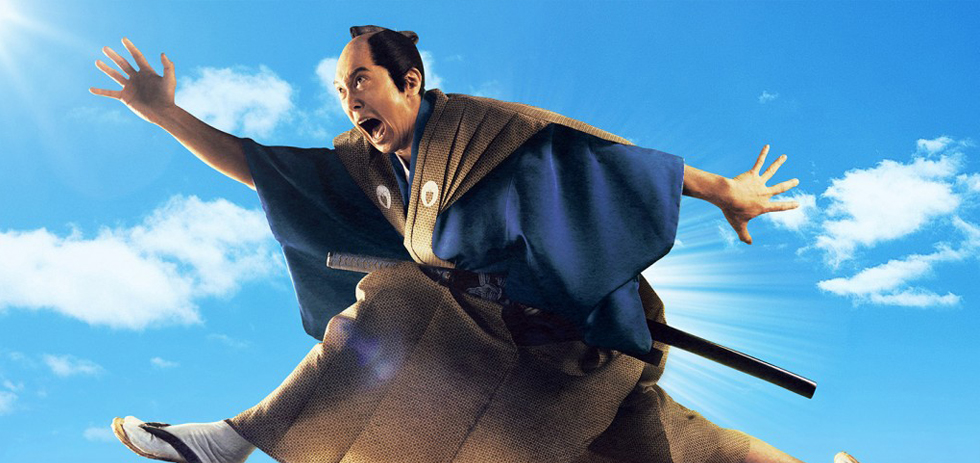“Gentlemen, haul ass!” There’s a gutsy underdog spirit that emanates from Samurai Hustle, as it pits a troupe of likeable goofballs in a cross-country race to protect their village from dishonour and destruction. With its functional characters and a relaxed aesthetic, it’s a fun watch with enough laughs to be somewhat worthwhile.
In the late 18th century, Japan is under shogun rule and clans are required to make a biennial voyage to Edo as a life-or-death show of respect. Masaatsu Dairo and his clan arrive home from their own procession, exhausted and impoverished but happy to return to their old lives. Before their lord Masaatsu Naito can even finish snacking on pickles, disaster strikes: the shogun has ordered them back to Edo all over again within five days, lest their humble home gets wiped off the map. This is the evil plot of Nobutoki Matsudaira, a greedy councillor spreading lies in the hope of wiping out the back-woods people and taking what they have. Armed with only their wits and their running legs, the brotherhood pulls together to traverse the land in time and save themselves.
The good-guy samurai are a colourful bunch, each inheriting the bare minimum quirk and plot function to work. Dairo is a fine leader, alternating between dopey optimism and straight-man playing, while his brainy right-hand man Soma being humorously exasperated. The rest of the cast has enough personality to be interesting, be it the duplicitous ninja-for-hire that leads them through the woods, the cook who whips up cost-efficient meals, or the chamberlain who plays Hawkeye to their Avengers, i.e. has mad skills with a bow and is just happy to be there. And, of course, the villain is as ruthless and hammy as they come. They aren’t given even a shadow of an arc, and the ones that are have been written with stranger priorities in mind, such as the studious secretary Akiyama, who acts on early advice to be more reckless once in a while, only to get mortally wounded for his trouble as a way of stoking drama in the final clash. To think about the implications of that and similar turns would be giving it way more thought than it demands, though; we’re in the kind that will put characters’ names on the screen as they’re introduced, after all. 1 It strives to be uncomplicated and simple, and it accomplishes that just fine.
Our heroes’ pursuit from hired assassins and bandits makes for a few moments of eclectically-staged warfare, which strays very little from rigid master shots in a way that gels nicely with the film’s easy tone. Crossed swords aren’t the clan’s biggest problem, however. Short on funds and people power, the group has to sustain their public dignity in increasingly clever ways. This makes for moments of good-natured comedy that are more memorable then the minimally-bloody face-offs, and better constructed. They build up so pleasingly that one especially clever joke invoking seppuku (seriously) is strong enough to forgive the wildly cheap instance of deus ex machina immediately after. Again, simplicity is the name of the game, and Hustle has no trouble in simplifying plot and visuals to get there.
The sedate charm has its limits, though, and that becomes unavoidably noticeable in one nagging instance. The plot wanders at length through a storyline involving a lowly geisha named Osaki, and past her weird habit of saying the phrase “poop and screw”2, she has shockingly little to do that’s interesting. The film then becomes bizarrely misguided and spends time showing us a non-graphic flashback to her childhood rape, without quite establishing why it’s even relevant. Soon after is a flashback for Naito showing the origin of his claustrophobia, which is his nanny locking him in a cupboard as punishment, as though that is somehow comparable to being sexually abused as a young girl. This implicit comparison is the only false note struck in the whole affair, but it’s a problematic one that doesn’t even need to be present.
There’s some slackness and filler in Samurai Hustle across its two hours, but it’s easy to take within the rollicking tone it strikes and the humorous constructs it builds up. It aims to put a dumb smile on your face and never becomes severely aggravating in doing so, even when it busts out anachronistic J-Pop for its cliché end credits sequence. If you’re after a great big guffaw among the headier and stranger offerings at the festival, then look no further.

